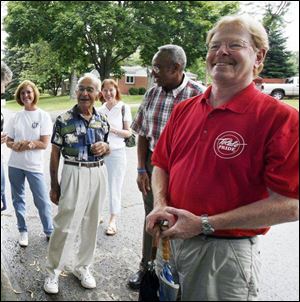
Northwest Toledo block watch leader will accept award for excellence
7/1/2008
Members stand near - and by - their captain, Michael Dearth, right, who heads the Toledo Block Watch program.
Michael Dearth knocks on doors to keep his northwest Toledo neighborhood safe.
As one of hundreds of block captains in the Toledo Neighborhood Block Watch Program, Mr. Dearth encourages neighbors to help protect the community by working with their local law enforcement agents and keeping a watchful eye.
Today, in Indianapolis, Mr. Dearth, who also is the program's chariman, will accept a National Sheriffs' Association award of excellence for neighborhood watch groups on behalf of the 170 Toledo neighborhood groups comprising the program.
Since 2004, the sheriffs' association has highlighted two law enforcement agencies and one neighborhood watch group that excel at promoting neighborhood watch in their communities.
"One neighborhood at a time, we're going to displace [criminals] until they're out of the city," Mr. Dearth said.
The program, which has more than tripled in size since 2003, divides Toledo in seven sectors.
Appointed sector leaders oversee area leaders and block captains who directly are involved with individual neighborhoods.
Mr. Dearth's tranquil neighborhood, near Greenwood Elementary School, has a mix of young singles, families, and retirees. Homes are close together and the streets have little traffic. It is classically suburban.
Many residents said their block captain has a noticeable presence.
When Ellen Swartz had her car broken into, Mr. Dearth chided her for not locking the doors and not filing a police report.
"He wasn't nasty, but he didn't let me think he was happy with me," she said. "He's really in touch. He's passionate."
Daphne Early, a chemistry and physics teacher with two young sons, said Mr. Dearth keeps his neighborhood informed.
"If there's a police report or something that he sees, he'll come around and tell all of the neighbors," she said. "He knows everybody's name. It really makes me feel great that he's so active."
A close partnership with local police and fire departments buoy Mr. Dearth and the watch program's work.
Lucas County Sheriff James A. Telb, who wrote a one-page letter recommending the program for the sheriffs' association distinction, said partnerships and a large number of active groups are reason for the program to stand above some 100 other nominees.
"It's just incredible how many groups, how many entities, agencies, and people have all come together over the year to make this Block Watch and make this community a better place," he said. "We are grateful for this partnership that we have with the citizens."
Sheriff Telb also said neighborhood meetings addressing a range of issues make the program particularly strong.
Mr. Dearth, like many local watch leaders, leads meetings the second week of every month, discussing not only crime, but also concerns about potholes, garbage pick-up, prostitution, and neighborhood safety.
"Anything anybody has a care about that shows up, Mike will discuss with them, or he'll write it down and get back to them," Ms. Swartz said.
A sheriffs' association advisory board of law enforcement agents and crime prevention specialists nationwide makes the selection. Winners were notified in May.
Robbi Woodson, program director for the National Sheriffs' Association, a nearly 70-year-old group, said a variety of qualifications separates one watch program each year from the rest.
"Each one of the members [of the advisory board] looks for something different," she said.
"In past winners, it's always been very clear that there is the support of the town council, or the chief himself, that there's a government-civilian partnership."
Mr. Dearth said the community service section of the Toledo Police Department acts as "the muscle" of the watch program. The idea is not to have citizens intervene in criminal situations, but instead to report incidents to the police.
But at least one of Mr. Dearth's neighbors said he thinks the watch process is ineffective.
"People aren't actively watching your homes," John Stebbins said.
"I've had the windows smashed out of my car, the radio ripped out of my dash, and my antenna stolen. I used to have a workshop in the garage, but I don't now. We put our cars there."
Many residents reported incidents of vehicle break-ins, vandalism, and even theft.
Mr. Dearth said that type of criminal activity was more pronounced at one time, but education efforts have reduced the problems.
"We must be doing something right because we don't have much crime in my neighborhood," he said.
Contact Matthew Eisen at:
meisen@theblade.com
or 419-724-6077.